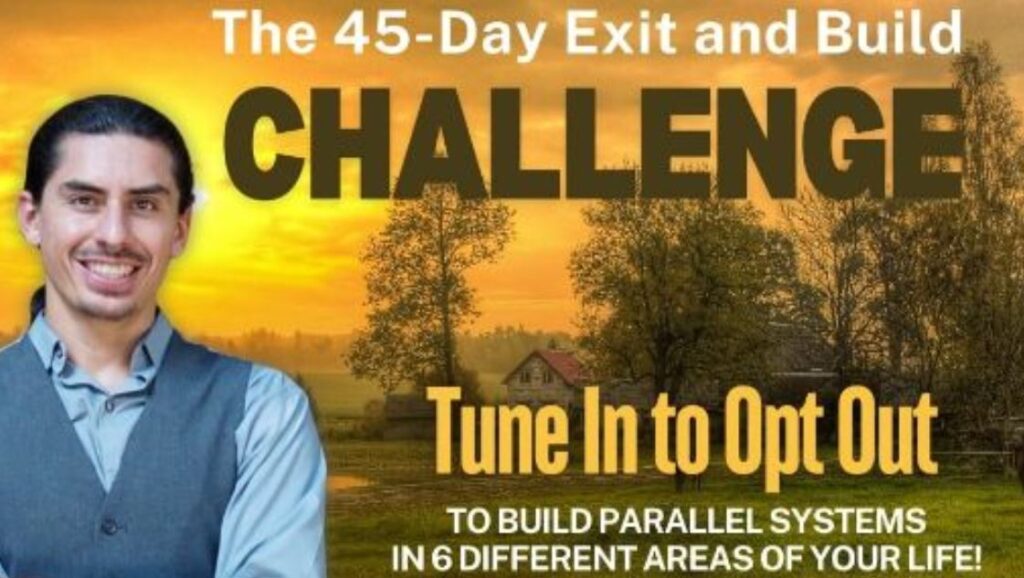Derrick Broze’s “Exit and Build” strategy presents a holistic approach to personal and community resilience, with a focus on empowering individuals to create independence in various sectors of life. As he concludes a seven-week series, the final week emphasizes the need to integrate this approach across all life aspects. The program breaks down its teachings into seven critical areas, which include Food, Money, Technology, Land, Education & Knowledge, Mindset & Habits, and culminates with the discussion on Thinking Holistically. This structure is designed to guide participants in developing a comprehensive understanding of how different elements of life interconnect, ultimately leading towards self-sufficiency and empowerment.
In the inaugural week, participants explored the significance of food as the foundation of a resilient lifestyle. Emphasizing the importance of local, sustainable food sources, Broze encourages individuals to consider not only what they eat but also how it is produced. This week aimed to ignite one’s awareness of food systems, prompting shifts towards organic gardening, permaculture practices, and community-supported agriculture initiatives. By encouraging participation in local food networks, the program seeks to foster a sense of community while decreasing dependency on industrialized food systems.
The second week stood out with a focus on Money, urging participants to critically examine their financial systems. Broze introduces concepts like alternative currencies, bartering, and investing in local economies. The aim is to promote financial autonomy and reduce reliance on traditional banks and financial institutions that may restrict individual freedoms. By addressing the issue of money from a holistic standpoint, Broze encourages a re-evaluation of spending habits and financial literacy, aiming for a more sustainable approach to personal finances that aligns with the broader vision of the Exit and Build strategy.
When the program shifted to Technology in the third week, participants were encouraged to explore how technology can either empower or hinder their autonomy. This week highlighted practical solutions such as decentralized technologies, open-source software, and privacy tools that promote connectivity without compromising personal freedom. Broze emphasizes that while technology can be beneficial, it must be embraced consciously to prevent surveillance and control from larger entities. The discussion directed attention to establishing a tech-savvy community that appropriately leverages technology for self-sufficient living.
Week four delved into the importance of Land, focusing on strategies for acquiring and maintaining land for sustainable living. Broze advocates for connecting with local land initiatives, discussing ways to cultivate communal living spaces, shared resources, and eco-village concepts. The need for stewardship of the land was underscored, promoting responsible agricultural practices and an intimate relationship with nature. Participants explore visions of self-reliance that cannot be achieved without secure access to land and resources, furthering their connections to their environments and communities.
The fifth week shifted the attention to Education & Knowledge, emphasizing the importance of self-directed, experiential learning. Broze critiques conventional educational systems, suggesting that they often stifle creativity and critical thinking. Through alternative education models such as unschooling, cooperative learning, and mentorship, participants are encouraged to take initiative in their learning journeys. This segment of the program connects with the broader theme of empowerment, demonstrating how knowledge can lead to skill development and contribute to self-sufficient living.
As participants moved into the penultimate week, Mindset & Habits came into focus. Broze pointed out the significance of cultivating a mindset that embraces resilience, adaptability, and community. This week involves practical exercises aimed at developing positive habits and shifting unhealthy patterns that hinder progress. The interconnectedness of mindset and behavior was discussed, showcasing how personal and collective habits can either foster or obstruct the goals of independence and sustainability.
Finally, in the concluding week of Thinking Holistically, Broze encourages a reflection on how all previous discussions interlink. This week serves to solidify the understanding that living in a holistic manner involves recognizing the unique interplay between various segments of life. By integrating the principles of self-sufficiency, community engagement, informed choices, and a healthy mindset, participants are equipped to not only implement the Exit and Build strategy in their lives but also contribute positively to their communities. This comprehensive approach encapsulates the essence of the program while inspiring individuals to actively participate in reshaping their worlds for future generations.

